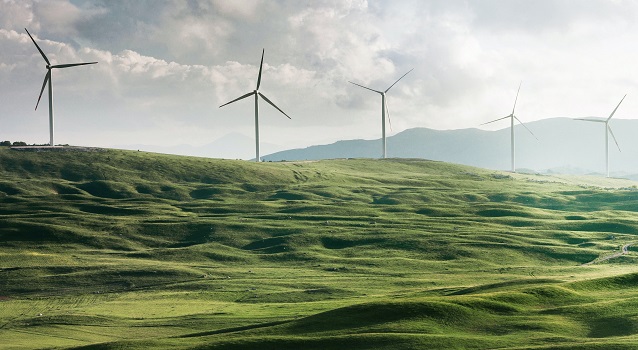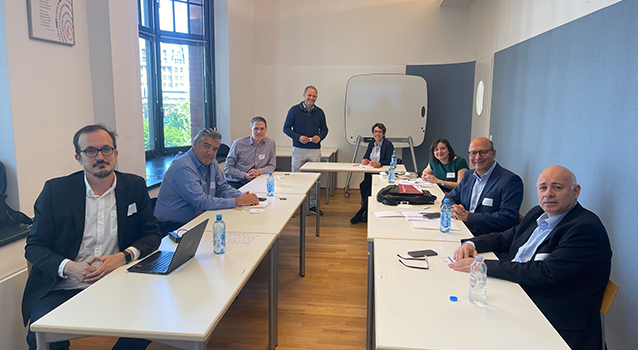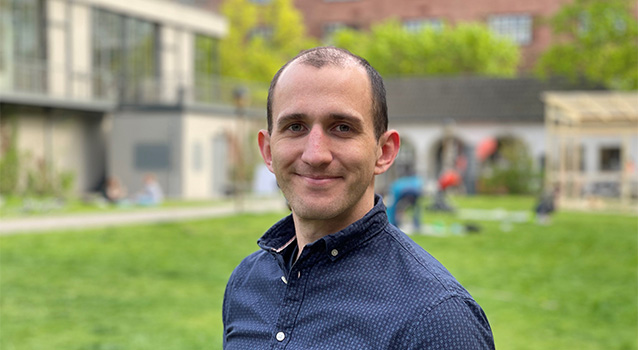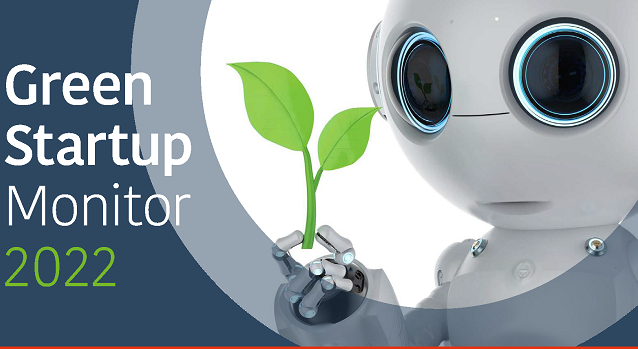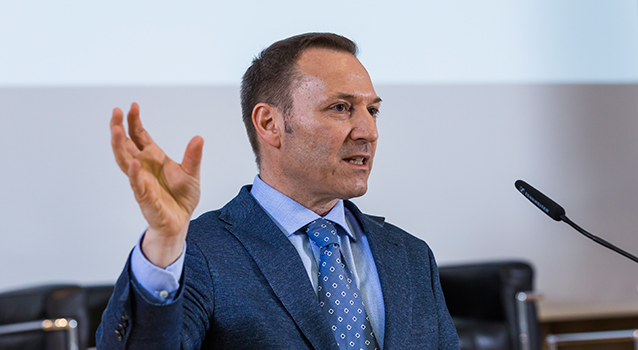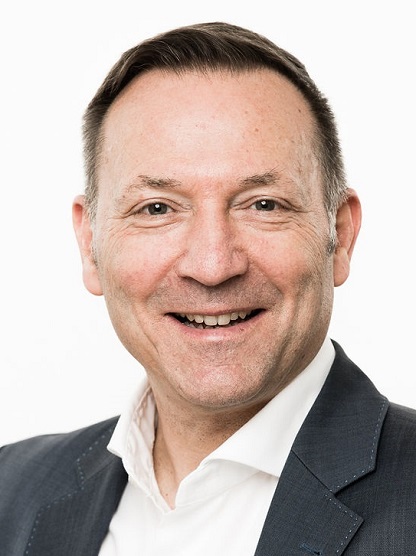100 percent renewable energy – possible?
Can we manage to transform the energy system completely to renewable energies? This is what Borderstep co-founder Dr. Severin Beucker talks about with the RESET digital for good platform. In doing so, he presents the results of many years of research work.
His conclusion is clear:
“The energy transition will only succeed with efficiency and intelligence.
How sustainable is digitalization? How can the energy transition become more efficient? Do we need regulations to ensure that the switch to renewable energies really succeeds? Severin Beucker discusses questions like these with author Sarah-Indra Jungblut.
The interview was published as part of RESET’s dossier Energy Transition – The Future is Networked and can be read free of charge.
Borderstep expertise for Greece
Borderstep expertise for Greece: The Goethe-Institut organized a trip to Germany for a delegation from Greece on behalf of the Federal Foreign Office. Borderstep supported the project with expertise on sustainable entrepreneurship and green start-ups.
Trip to Germany on the topic of “Change and Innovation”
The participants are representatives from research, politics and business. They will visit Germany from May 8 to 12, 2022, to learn more about the topic of “Change and Innovation” and to experience practices in this field on site.
The thematic focus will be on the promotion of innovative companies and start-ups in Germany. Sessions on technology, energy and the environment, also in connection with structural change in former coal mining areas, will complement the program.
Innovation in practice: Green Startup Monitor 2022
Alexander Schabel, Borderstep Senior Project Manager in Sustainable Entrepreneurship, presented current Borderstep research projects and successful practical projects in a session at the Instituto Cervantes in Berlin-Mitte (photo) as part of this study tour. This included the results of the Green Startup Monitor 2022, which Borderstep published in spring together with the Startup-Verband.
The goal of the trip is also to exchange ideas with regard to future collaborations and network building. The program was launched as part of the Greek government’s current support for the start-up environment.
ImpactNexus: Making sustainability investable
ImpactNexus was founded at the beginning of 2021 as a spin-off of the Borderstep Institute in Berlin. The company’s software products are primarily aimed at investors who want to manage the sustainability of their portfolios. In this interview for the website StartGreen, co-founder and CEO Dr. Jannic Horne talks about current developments in sustainability regulation. He knows why measuring the sustainability of startups is currently becoming increasingly relevant.
ESG and Impact: What’s the difference and why are these topics becoming increasingly important for start-ups as well?
While ESG (Environment, Social, Governance) focuses on minimizing risk, impact investing is more about taking a long-term view of one’s impact. Impact investing aims to achieve a significant positive social or environmental change with the investments made. ESG criteria are now applied to look for non-financial risks that can have a material impact on the value of an asset.
Today, there are good reasons for both large companies and small businesses such as start-ups or SMEs to engage with the topic of ESG and impact. Investors consider ESG as a major risk factor when considering new investments. Startups that are strong in ESG are considered safer companies because they have a lower risk of civil litigation or government fines, for example. In addition, more and more investors are specifically looking to make a positive impact. Particularly with regard to climate change, the number of impact investments is rising sharply. Climate tech, for example, is the fastest growing startup sector in Europe, growing 10-fold in four years. Compared to 2017, $1.1 billion has been invested in the sector, up from $11 billion in 2021. However, the benefits do not stop at better access to capital: for example, the issue is becoming increasingly important both on the customer side and in the area of recruiting qualified personnel, and can represent a decisive competitive advantage.
What is the situation on the side of the investors? What motivates them to become active in these topics?
Private capital plays a central role in the transition to a sustainable future. Legislators have also recognized this, which is why the regulatory environment at EU level for the financial sector is currently undergoing fundamental change. The EU Disclosure Regulation (SFDR) is particularly important here. The regulation, which came into force in March 2021, obliges financial market participants and advisors to incorporate ESG criteria within the entire process from disclosure obligations at company and product level, to advising clients, to investment decisions and risk management. From January 1, 2023, the corresponding reporting requirements will also be applied. The regulation will therefore also oblige venture capital players to underpin any decision-making processes relating to the product and company level from the point of view of sustainability.
How does ImpactNexus become active here?
ImpactNexus help investors such as VCs or private equity firms, as well as their portfolio companies, to reduce the complexity of these developments and make sustainable decisions in a simple way. For portfolio managers, this means that they can gain insights into the ESG risks of their investments in no time at all. Simple reporting features help them, as does the ability to track key sustainability performance metrics across the portfolio. Thus, many important steps have been taken to meet the demands of various new regulatory requirements.
What makes ImpactNexus different from other software providers?
What’s special about our solution is that we don’t just target investors, we take the portfolio companies by the hand with our software and help them. Our approach makes it easy for both the companies and their supporters. In addition, we are using AI processes to build a unique impact database that contains the social and environmental impacts on countless products and services. This will enable us to evaluate the impact of companies in an increasingly automated way. By the end of 2022, we will complete a first automated assessment for climate impacts. We will then successively add other important sustainability topics. In addition to the assessments, our tools also provide concrete suggestions for improvements to more sustainable measures, materials or processes.
“Impact” is part of the start-up name: How do the aforementioned themes connect to the concepts of impact measurement and management?
Like important international players, we finally understand the topic of impact as the overarching task. However, the precise measurement and management of impact based on the business model requires a very profound examination of a company’s own processes. This is a lot of effort. In addition, the measurement of impact very often takes place afterwards – often by then considerable damage has already been done to people and the environment. Our solution enables early intervention in this process and models any effects. This makes impact management much easier. Measurement is then still necessary afterwards. In our view, however, both are needed – good forecasts and then actual empiricism.
Are there any specific tips on what investors and startups can do to address the issue in a straightforward way?
Investors should ask themselves early on whether they want to address sustainability in their portfolio primarily as a risk factor or actually analyze the impact of the entire portfolio. According to the objective, they should focus on evaluating the appropriate targets and metrics for each company. Here, it is advisable to focus on the metrics that are particularly important. In other words, those that have a supposedly high sustainability impact. For a manufacturing company, for example, this might be annual greenhouse gas equivalent emissions. For a digital start-up, however, the focus could be on metrics from the area of diversity, for example.
At ImpactNexus, we are working on successively further automating all relevant processes and enhancing them with intelligent recommendations for potential improvements. For this, we are currently working on projects with DATEV as well as a research project within the framework of the Nationale Klimaschutzinitiative (NKI). If you would like to learn more about this, you can find out more on our website and easily make an appointment for a demo.
4th Green Startup Monitor published
With their great innovative capacity, green startups are driving the transformation of the German economy. This is shown by the 4th Green Startup Monitor, compiled by the Startup Association and the Borderstep Institute for Innovation and Sustainability.
Young innovative companies in Germany have a clear focus on the issue of sustainability: The support of innovations to tackle climate change (38%) forms the most important demand of German startups to politicians after the reduction of bureaucracy (40%). Thus, they are the driver of the sustainable transformation of our economy. This becomes clear in the energy sector: More than two-thirds of all startups in the energy sector can be classified as green because they accelerate Germany’s steps toward climate neutrality with their environmentally friendly products and services.
Women founding “green”
Green startups have become a central part of the German startup ecosystem; almost one in three German startups is green, according to the findings of the Green Startup Monitor. In addition, green startups are also doing pioneering work in terms of diversity. At 21 percent, the proportion of female founders is significantly higher than in the startup ecosystem as a whole.
At the same time, green startups want to have the greatest possible impact with entrepreneurial means and are transformation-oriented: 35% of these startups combine their sustainable orientation with an orientation toward rapid growth in order to change value chains and markets. In doing so, they meet the challenge of a sustainable transformation of the German economy with radically new entrepreneurial approaches to solutions, whereby they are more innovative and technology-oriented than conventional startups. German universities are an important starting point for green innovations. Almost one third of all green startups are research-related startups.
Little push in the construction and financial sectors
Green innovations are essential for achieving the climate targets. Green startups are spread across almost all sectors of the German economy. In addition to the energy industry, the proportion of green startups in agriculture is particularly high (66 percent). Other climate-relevant sectors such as construction and real estate (25 percent) or tourism (18 percent) urgently need to catch up. The same applies to financial service providers. Startups in the banking, finance and insurance sectors are not providing sufficient impetus for the realization of the Sustainable Finance Strategy of the EU and the German government.
Universities as hotspots
The dense network of outstanding university research in Germany is the origin of numerous innovative green companies. Almost one third of all green startups are research-related startups. Green founders often get to know each other at university (40%). Among green startups, the share of founders with a degree in engineering is significantly higher (29 percent) than among non-green startups (20 percent). While three out of four startups have taken advantage of consulting services and financial support such as EXIST funding, there is still considerable need for development in terms of sustainability-related offerings. Sustainability-related consulting and support services for startups have so far been scarce at German universities.
Prof. Dr. Klaus Fichter, Co-author GSM22, Founder and Director of the Borderstep Institute for Innovation and Sustainability, Carl von Ossietzky University Oldenburg, Adjunct Professorship for Innovation Management and Sustainability (PIN):
“The Green Startup Monitor 2022 shows the high importance of universities and research institutions for innovative green startups. One serious deficit, however, is that universities have so far provided hardly any sustainability-related services as part of their startup support. Here, university managers and funding policy are equally in demand. The study Sustainability in University Start-up Support shows practical examples and starting points.”
Prof. Dr. Yasmin Olteanu, Co-Author GSM22, Borderstep Research Fellow, Berlin University of Applied Sciences, Professor of Business Administration/Entrepreneurship.:
“Every third green startup is transformational, i.e. a high potential for the big transformation towards a sustainable society and economy. These green startups think much bigger, are more innovative and technology-oriented – and thus actually highly attractive to funders. Nevertheless, a lack of capital is currently holding them back – especially in the area of venture capital. Our demand: a targeted improvement in the financing conditions for transformation-oriented startups in Germany.”
David Hanf, Vice Chairman Startup Association: “The Green Startup Monitor 2022 clearly shows that startups with a positive ecological impact have established themselves in Germany at a high level. This is good news in the context of the necessary transformation towards a climate-neutral economic system, because what matters now is speed and consistent implementation. To this end, startups need target-group-oriented support, especially for growth companies that have the potential to sustainably change markets in the sense of a generation-appropriate future.”
Green Startup Monitor
The Green Startup Monitor analyzes the importance of those startups that contribute to the ecological goals of a Green Economy with their products and services. It was published for the fourth time by the Borderstep Institute and the German Startups Association in 2022. The study is based on data collected through an online questionnaire from 1,707 innovative and growth-oriented companies that are less than 10 years old and have their headquarters in Germany. The Green Startup Monitor can be downloaded free of charge.
Study Sustainability in University Start-up Support
The brochure offers universities and especially university start-up consulting an insight into the spectrum of support services.
Borderstep Institute for Innovation and Sustainability gGmbH
As an independent and non-profit scientific institution, Borderstep researches the future and examines what is coming (innovation) and what is staying (sustainability). The focus is on developing solutions to problems and action strategies for sustainable economic activity.
Startup Association
The Startup-Verband is the representative and voice of startups in Germany. It explains and represents the interests, viewpoints and concerns of startup companies to legislation, administration and the public. It promotes innovative entrepreneurship and carries the startup mentality into society. The association sees itself as a network of startups in Germany.
Responsible Innovation Story with Borderstep
What is the current state of sustainability in Europe? Can the EU position itself internationally with it? And what do sustainable business models look like in concrete terms? “Responsible Innovation Story” explores these questions in a video interview.
Borderstep Director Prof. Dr. Klaus Fichter talks to host Prof. Dr. Andre Martinuzzi.
The most important findings of the interview:
- Sustainability innovation has gained a lot of momentum, especially in the vibrant start-up scene.
- However, funding programmes that support start-ups to scale up and leave their niche markets are still underrepresented.
- Only by building a robust sustainability-based innovation ecosystem can we create a future-proof unique selling proposition for Europe
Special Issue on Assessing and forecasting the sustainability impact of new ventures
The Journal of Cleaner Production is planning a special issue to evaluate and forecast the impact of new ventures on sustainability. Borderstep director Prof. Klaus Fichter is one of the guest editors.
Journal of Cleaner Production calls for submissions
Scientists are invited to submit their research for publication.
Paper submission procedure:
- Proposal submissions can be submitted until March 31, 2021, after which they can be elaborated in detail. The text length must not be less than 3000 words.
- A Paper Development Workshop on April 30, 2021 will support the researchers in the process. The participants will be selected by the guest editors. The event will take place online.
- The deadline for submission of full papers is July 1 to August 31, 2021.
More information on the schedule can you find here.
Guest editors of the special edition are:
- Klaus Fichter, Borderstep Institut und Carl von Ossietzky Universität Oldenburg, Deutschland
- Florian Lüdeke-Freund, ESCP Europe Business School, Deutschland
- Stefan Schaltegger, Leuphana Universität, Deutschland
- Simon Schillebeeckx, Management-Universität Singapur, Singapur
Start-ups implement environmental innovations
Entrepreneurs and start-ups are key players in the implementation of environmental innovations and new approaches to cleaner production. Therefore, the analysis of the impact of entrepreneurial ventures is of central importance for research in the field of cleaner production and entrepreneurship.
In order for entrepreneurship to promote sustainable development, it is crucial to understand how established firms and emerging young companies have a positive impact on sustainability.
Assessment of sustainability impacts of start-ups has hardly been researched so far
The sustainability impact of established companies and their products and services has been a key topic in business-related sustainability research for many years. This is true, for example, in the areas of social and sustainability accounting and reporting as well as entrepreneurship research.
However, the assessment of sustainability consequences of start-ups, for example by means of life cycle assessments or social impact analyses, is a neglected research area. This special issue of the Journal of Cleaner Production is intended to change that.
Green start-ups need more tailwind
Looking for tailwind and capital: An article on the Bertelsmann Stiftung’s innovation platform presents the results of the Green Startup Monitor 2020. Borderstep uses this instrument to analyze Germany’s green start-up scene in cooperation with the .
The team of authors examines how the ecosystem of sustainable start-ups has developed in recent years and which formats have a positive impact on the community. One example of this is the StartGreen Award, which Borderstep has been presenting since 2015 as part of the Startup Week Germany.
The fact that sustainability is not an explicitly “green” topic is demonstrated by the Sustainability4All project, which the article also introduces. Its goal is to anchor sustainability in the entire founding process – for future-proof business and stable business models. As the current crisis demonstrates, all companies are well advised to address this issue. And not just to serve “the environment”, but first and foremost themselves.
Investors now recognise the value of sustainable business models and manage their investments accordingly. Nevertheless, the capital question remains the biggest problem of green start-ups, the authors state.
You can read the full article here.
Digital energy management in existing buildings
The Smart Living industry association has submitted a statement on the Building Energy Act to Peter Altmaier, Federal Minister of Economic Affairs and Energy. In this statement, the association refers to the climate protection contribution of digitisation in buildings.
For this statement, Borderstep has calculated figures on the possible CO2 reduction through building automation systems in existing residential buildings in Germany.
“With an annual renovation rate of 300,000 apartments, around 2.3 million tons of CO2 can be avoided in 2030,” explains Dr. Severin Beucker, an expert on smart energy at Borderstep.
The building stock in Germany is responsible for a significant proportion of energy consumption and CO2 emissions. Digital energy management can help to significantly reduce this share and promotes the use of renewable energies. It is both economically and ecologically an important alternative for the refurbishment of existing buildings.
The use of smart building technology and intelligent control of energy use in buildings can thus make a substantial contribution to climate protection. This should be supported by targeted incentives for the use of intelligent systems and digital solutions in buildings, according to the statement.
The figures come from the Borderstep working paper “Reduction of CO2 emissions in existing buildings through digital energy management“. The publication (only in german) can be downloaded free of charge.
Digitisation = climate protection?
Cloud Computing, 3D-Printing, Big Data, Industry 4.0: The world of work and life is changing drastically due to digitisation. How does this affect climate protection? This is the topic of CliDiTrans, a new project of the Borderstep Institute.
Some studies are calculating the potential for reducing global CO2 emissions through ICT by up to 20 percent by 2030. These studies, however, do not take two essential aspects of increasing Digitisation into adequate consideration:
Firstly, digitisation triggers changes in demand. Completely new products and services are emerging or existing solutions are becoming better quality and cheaper at the same time, so that there is greater demand for them. Secondly, the use of ICT solutions is associated with national and international shifts in production processes.
Together with the ZEW – Leibniz Centre for European Economic Research and the practice partner Zweckverband Kommunale Datenverarbeitung Oldenburg (KDO), Borderstep analyses the climate protection effects of digitisation on the basis of case studies and macroeconomic considerations.
The project is funded by the Federal Ministry of Education and Research (BMBF) within the framework of the funding programme “Economics of Climate Change”.
Interview: Germany, Green Energy Valley
Clean Energy Wire interviewed Borderstep Director Prof. Dr. Klaus Fichter about the start-up scene in Germany. What role do engineers play in the “Green Energy Valley” to which Germany has developed? How can start-ups raise capital compared to Silicon Valley?
The interview introduces the reader to current research results of the Borderstep Institute, such as the Green Startup Monitor, which Borderstep has created in collaboration with the Startup Association of Germany.
The English-language portal Clean Energy Wire (CLEW) prepares the topic of energy transition in Germany for international media.
Read the full interview here.
